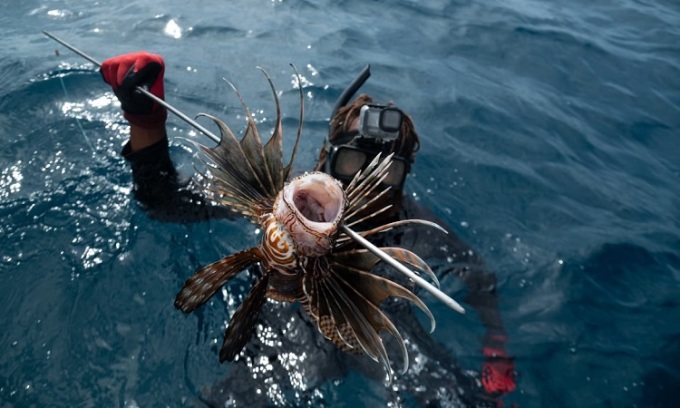In Venezuela, tourists and fishing communities are encouraged to catch and eat lionfish before they wipe out other species.

William Álvarez uses a hook to skewer a lionfish. Photo: Guardian
With their bright colors and venomous spines, lionfish don’t just look dangerous; they pose a threat to all other fish in the Caribbean. In Venezuela, William Álvarez, a resident of Chichiriviche de la Costa Bay on the central coast, is working to stamp out the menace. He’s also encouraging tourists and others in his fishing community to catch and eat lionfish to help control their spread. Lionfish are killing off herbivorous fish that are vital to coral reefs and the livelihoods of coastal residents, the Guardian reported on September 26.
Lionfish were introduced to the region by accident from the Indian and Pacific Oceans , where they live alongside predators such as moray eels, sharks, groupers, and toadfish. But in the Caribbean, they have no natural predators. The bright orange, brown, and black stripes that cover lionfish bodies and their venomous spines serve as warning signals to other species that might want to eat them.
“It’s not an easy fish to catch. If it gets caught in your net, you risk getting injured by its venomous spines and not being able to work for days,” says Rafael Mayora, who works with Álvarez. “That’s why many fishermen choose not to go near them. Their presence is also a risk for tourists.”
Because fishermen often avoid lionfish and they reproduce so quickly, laying up to 30,000 eggs every four days, their numbers have skyrocketed. According to Álvarez, the best technique for catching lionfish is with spears or harpoons, but it is a time-consuming process. “You can’t just drop a net and pull them up. You have to throw the spears at each one,” Álvarez says. He encourages people to catch and eat lionfish through social media, introducing the idea to tourists and locals alike. “I catch lionfish all the time. Sometimes I cook them to sell, sometimes I share them with my family, but I always have fresh lionfish in the freezer,” Álvarez says.
Lionfish, native to the Indian and Pacific oceans, have become one of the most destructive invasive species on the planet. A voracious predator, they have spread across reef systems in the Atlantic, Gulf of Mexico and Caribbean at an astonishing rate, laying thousands of eggs a day and two million a year. They eat smaller commercially valuable fish such as snapper and grouper or fish that maintain healthy coral reefs. Conservationists encourage people to eat invasive lionfish, which have now spread to the Mediterranean, with annual hunting tournaments in Florida and the Caribbean.
An Khang (According to Guardian )
Source link







































































































Comment (0)